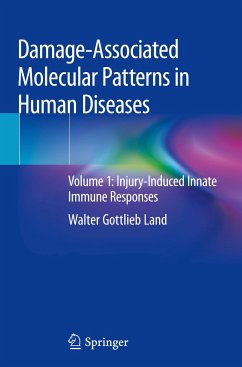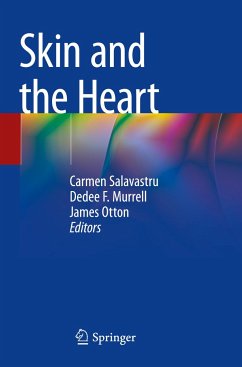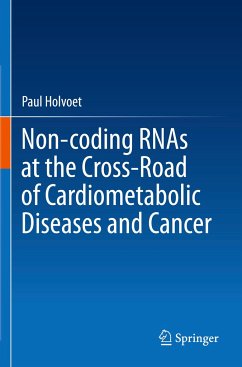
Damage-Associated Molecular Patterns in Human Diseases
Volume 3: Antigen-Related Disorders
Versandkostenfrei!
Versandfertig in 1-2 Wochen
105,99 €
inkl. MwSt.
Weitere Ausgaben:

PAYBACK Punkte
53 °P sammeln!
The core of this three-volume book deals with damage-associated molecular patterns abbreviated "DAMPs", which are unique molecules that save life and fight for survival of all organisms on this planet by triggering robust inflammatory/immune defense responses upon any injury, including those caused by pathogens such as viruses and bacteria. However, these molecules also have a dark side: when produced in excess upon severe insults, they can trigger serious human diseases.The three volumes present current understanding of the importance of DAMP-promoted immune responses in the etiopathogenesis ...
The core of this three-volume book deals with damage-associated molecular patterns abbreviated "DAMPs", which are unique molecules that save life and fight for survival of all organisms on this planet by triggering robust inflammatory/immune defense responses upon any injury, including those caused by pathogens such as viruses and bacteria. However, these molecules also have a dark side: when produced in excess upon severe insults, they can trigger serious human diseases.
The three volumes present current understanding of the importance of DAMP-promoted immune responses in the etiopathogenesis of human diseases and explore how this understanding is impacting diagnosis, prognosis, and future treatment. This third volume addresses the potential of DAMPs in clinical practice, as therapeutic targets and therapeutics, by focusing on a description of antigen-related diseases, which are pathogenetically dominated by DAMPs, that is, infectious and autoimmune disorders and allograftrejection (as an undesired function of these molecules), as well as tumor rejection (as the desired function of these molecules).
The book is written for professionals from all medical and paramedical disciplines who are interested in the introduction of innovative data from modern inflammation and immunity research into clinical practice. In this sense, the book reflects an approach to translational medicine. The readership will include all practitioners and clinicians, in particular, ICU clinicians, infectiologists, microbiologists, virologists, hematologists, rheumatologists, diabetologists, neurologists, transplantologists, oncologists, and pharmacists.
Also available: Damage-Associated Molecular Patterns in Human Diseases - Vol. 1: Injury-Induced Innate Immune Responses; Damage-Associated Molecular Patterns in Human Diseases - Vol. 2: Danger Signals as Diagnostics, Prognostics, and Therapeutic Targets.
The three volumes present current understanding of the importance of DAMP-promoted immune responses in the etiopathogenesis of human diseases and explore how this understanding is impacting diagnosis, prognosis, and future treatment. This third volume addresses the potential of DAMPs in clinical practice, as therapeutic targets and therapeutics, by focusing on a description of antigen-related diseases, which are pathogenetically dominated by DAMPs, that is, infectious and autoimmune disorders and allograftrejection (as an undesired function of these molecules), as well as tumor rejection (as the desired function of these molecules).
The book is written for professionals from all medical and paramedical disciplines who are interested in the introduction of innovative data from modern inflammation and immunity research into clinical practice. In this sense, the book reflects an approach to translational medicine. The readership will include all practitioners and clinicians, in particular, ICU clinicians, infectiologists, microbiologists, virologists, hematologists, rheumatologists, diabetologists, neurologists, transplantologists, oncologists, and pharmacists.
Also available: Damage-Associated Molecular Patterns in Human Diseases - Vol. 1: Injury-Induced Innate Immune Responses; Damage-Associated Molecular Patterns in Human Diseases - Vol. 2: Danger Signals as Diagnostics, Prognostics, and Therapeutic Targets.












